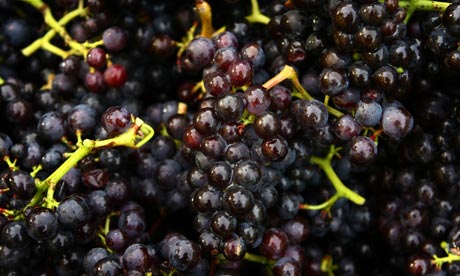
Taking supplements of a substance found in grape skin can lower sugar and fat levels in the blood and reduce blood pressure, according to a small study.
Scientists who gave tablets containing purified resveratrol to obese men found it had some metabolic effects similar to those from exercise and calorie restriction, including lowering blood pressure and blood sugar levels.
Research in animals over the past decade has suggested the compound can slow the development of age-related diseases and increase lifespan. However, these studies have attracted growing criticism and have yet to be replicated in humans.
"The effects of resveratrol were modest but they consistently point towards beneficial metabolic adaptions," said Prof Patrick Schrauwen of Maastricht University in the Netherlands, who led the new study. Although the chemical is found naturally in grape skin and red wine, there is no suggestion that it would be possible to ingest enough of it from these sources to gain the beneficial effect.
Prof Schrauwen and colleagues gave 11 obese men either a daily 150mg resveratrol supplement or a placebo for 30 days. Four weeks later, the two groups swapped over so that those who took the supplements first time around were given placebos and vice versa.
Regular measurements showed resveratrol lowered blood sugar levels and improved insulin sensitivity, as well as cutting triglycerides – fats found in the blood that can increase heart disease risk. Resveratrol also reduced both sleeping and resting metabolic rate and cut blood pressure.
Previous research has shown that calorie restriction can extend lifespan in laboratory animals. Some studies suggest it also offers protection from diseases such as cardiovascular disease and type 2 diabetes, though this remains controversial.
Calorie restriction works in a similar way to resveratrol, by triggering the production of a protein called SIRT1 which improves metabolic function and keeps cells healthy in the face of stress.
Muscle biopsies carried out by Prof Schrauwen's team confirmed that participants taking resveratrol saw increased SIRT1 levels. They also strongly suggested the beneficial effects on metabolism were associated with improved functioning of mitochondria, the energy factories within cells.
"Healthy people are good at switching efficiently from using fat as an energy source to glucose in the blood when it becomes available," said Prof Schrauwen. "The results of our pilot study tended to suggest that might be part of the link to the beneficial health effects of resveratrol, but that needs further study."
The results are published in the journal Cell Metabolism.
Prof Schrauwen, acknowledging that his sample size was small, said he was seeking funding for a larger and longer trial. "This is small, proof of principle study, but the results are so promising that I think it is important that we conduct a bigger study," he said.

